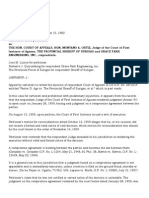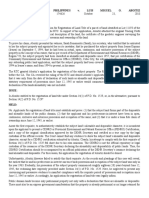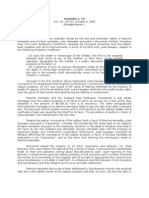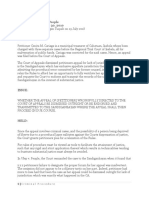People v. Pletcha, GR.R. No. 19029 June 27, 1977
People v. Pletcha, GR.R. No. 19029 June 27, 1977
Uploaded by
brahmsCopyright:
Available Formats
People v. Pletcha, GR.R. No. 19029 June 27, 1977
People v. Pletcha, GR.R. No. 19029 June 27, 1977
Uploaded by
brahmsCopyright
Available Formats
Share this document
Did you find this document useful?
Is this content inappropriate?
Copyright:
Available Formats
People v. Pletcha, GR.R. No. 19029 June 27, 1977
People v. Pletcha, GR.R. No. 19029 June 27, 1977
Uploaded by
brahmsCopyright:
Available Formats
Philippines v.
Pletcha
G.R. No. 19029-CR, June 27, 1977, 22 CA Rep. 807
Sison, J.
FACTS:
Tito Pletcha, Jr., farmer, invoking self-help in defense of the land he inherited from his father 19 years ago
against the workers of Radeco Corporation, who without court order, were constructing a fence in a
hacienda allegedly leased by the corporation from a certain Lopinco. Claiming actual possession and
ownership and believing that the land sought to be fenced was an integral part of the land he inherited,
Pletcha asked the group to desist from fenicing pending a resurvey he proposed, but he was totally ignored,
thus he fought off and prevented the workers. As a result of such resistance he was prosecuted and convicted
of grave coercion by the Municipal Trial Court. Pletcha appealed the decision of the MTC with the Court of
Appeals.
ISSUE: Whether the appellants action is a legitimate exercise of a private citizens selfhelp.
HELD: Yes. In the instant case,the usurpers possession has not yet become complete and the complainants
were in the act of building a fence. Such an act constitutes force in contemplation of the law. This act of
trespass justified the appellant to drive them away, even by means of bolo because they refused to listen to
his appeal which is reasonable. The appellant need not rush to the court to seek redress before reasonably
resisting the invasion of his property. The situation required immediate action and Art. 429 gave him the self
executory mechanics of self-defense and self-reliance. The provision in Art 429 of the New Civil Code
confirms the right of the appellant, an owner 28 and lawful possessor, to use reasonable force to repel an
invasion or usurpation, actual, threatened or physical of his property. The principle of self-defense and the
protective measures related thereto, covers not only his life, but also his liberty and property. The principle
of self-help authorizes the lawful possessor to use force, not only to prevent a threatened unlawful invasion
or usurpation thereof; it is a sort of self-defense. It is lawful to repel force by force. He who merely uses
force to defend his possession does not possess by force. The use of such necessary force to protect
propriety or possessory rights constitutes a justifying circumstance under the Penal Code.
You might also like
- Case Digest - Department of Education v. Mariano TuliaoDocument2 pagesCase Digest - Department of Education v. Mariano TuliaoXantine Kristel MoralesNo ratings yet
- Heirs of Roman Soriano V CADocument2 pagesHeirs of Roman Soriano V CAraykarloBNo ratings yet
- PNB V DE JESUSDocument1 pagePNB V DE JESUSTricia Sibal100% (1)
- 13 - PEOPLE. v. PLETCHADocument2 pages13 - PEOPLE. v. PLETCHAmark anthony mansueto100% (1)
- People - v. - Pletcha - Jr.20210825-12-1z4yq3Document7 pagesPeople - v. - Pletcha - Jr.20210825-12-1z4yq3marie janNo ratings yet
- People vs. Sangil, 208 SCRA 696 (1992)Document15 pagesPeople vs. Sangil, 208 SCRA 696 (1992)brahms100% (1)
- People V PletchaDocument2 pagesPeople V PletcharaykarloB67% (3)
- Isaguirre vs. de LaraDocument3 pagesIsaguirre vs. de LaraRAINBOW AVALANCHENo ratings yet
- De Jesus Et Al V Howmart CorpDocument1 pageDe Jesus Et Al V Howmart CorpSyous99No ratings yet
- Property Cases DigestDocument3 pagesProperty Cases DigestWilton Norman Jvmantoc100% (1)
- Miranda vs. FadullonDocument6 pagesMiranda vs. FadullonKR ReborosoNo ratings yet
- Pacific Farms Inc Vs Esguerra 30 Scra 684Document13 pagesPacific Farms Inc Vs Esguerra 30 Scra 684Che Poblete Cardenas100% (2)
- Galvan vs. SegundoDocument1 pageGalvan vs. Segundotrizia mae heruelaNo ratings yet
- 309 Fabie v. David, 75 Phil 536Document2 pages309 Fabie v. David, 75 Phil 536Mik ZeidNo ratings yet
- Land Bank of The Philippines V PerezDocument1 pageLand Bank of The Philippines V PerezAnonymous qjsSkwFNo ratings yet
- Pershing Tan Queto VsDocument2 pagesPershing Tan Queto VsAnna SanchezNo ratings yet
- 3) Bernardo Vs Bataclan DigestDocument3 pages3) Bernardo Vs Bataclan DigesthectorjrNo ratings yet
- Pardell v. Bartolome 23 Phil. 450Document2 pagesPardell v. Bartolome 23 Phil. 450Tryzz dela MercedNo ratings yet
- Javier Vs VeridianoDocument2 pagesJavier Vs VeridianoVILLANUEVA, Xezarajjah S.No ratings yet
- Sanchez Vs AsinganDocument1 pageSanchez Vs AsinganJanice100% (1)
- Chua v. Lo G.R. No 196743 August 14 2019Document5 pagesChua v. Lo G.R. No 196743 August 14 2019Gina FernandezNo ratings yet
- Pastor Ago vs. Court of AppealsDocument5 pagesPastor Ago vs. Court of AppealsJayzell Mae FloresNo ratings yet
- Case DigestDocument6 pagesCase DigestFlorencio Saministrado Jr.No ratings yet
- Spouses Sicad vs. CA J G.R. N 125888 J Aug. 13 J 1998Document2 pagesSpouses Sicad vs. CA J G.R. N 125888 J Aug. 13 J 1998DAblue Rey0% (1)
- Spouses Aguino v. Spouses AguilarDocument2 pagesSpouses Aguino v. Spouses AguilarChristian Roque100% (5)
- Isaguirre v. de LaraDocument2 pagesIsaguirre v. de LaraJamieNo ratings yet
- Garcia vs. CA (Property Law Case Digest)Document3 pagesGarcia vs. CA (Property Law Case Digest)Arvy AgustinNo ratings yet
- Azarcon Vs EusebioDocument1 pageAzarcon Vs EusebioKling KingNo ratings yet
- First Mega Holdings Corp. v. Guiguinto Water DistrictDocument1 pageFirst Mega Holdings Corp. v. Guiguinto Water DistrictArnold Benedel T. MADERAJENo ratings yet
- Cases Theory of Irrevindicability Fruits ExpensesDocument28 pagesCases Theory of Irrevindicability Fruits Expensestito bogsNo ratings yet
- Javier V Veridiano GR No L-48050Document1 pageJavier V Veridiano GR No L-48050mark anthony mansuetoNo ratings yet
- Republic OF THE Philippines v. Luis Miguel O. AboitizDocument13 pagesRepublic OF THE Philippines v. Luis Miguel O. AboitizChristina Aure100% (1)
- Bagaipo Case DigestDocument1 pageBagaipo Case DigestChristine Ann ContiNo ratings yet
- CHAVEZ V Public Estates AuthorityDocument1 pageCHAVEZ V Public Estates AuthorityMis DeeNo ratings yet
- Del Campo v. CA Co OwnershipDocument2 pagesDel Campo v. CA Co OwnershipyamaleihsNo ratings yet
- Quemel v. OlaesDocument1 pageQuemel v. OlaesJimboy FernandezNo ratings yet
- Of Ownership: JAVIER V. VERIDIANO II-Action For DeterminationDocument2 pagesOf Ownership: JAVIER V. VERIDIANO II-Action For DeterminationRonald Alasa-as AtigNo ratings yet
- Bustos v. Court of AppealsDocument2 pagesBustos v. Court of AppealsVILLANUEVA, Xezarajjah S.No ratings yet
- David Vs Malay Property Art 476Document2 pagesDavid Vs Malay Property Art 476demsanpedroNo ratings yet
- Valenzuela Vs UnsonDocument59 pagesValenzuela Vs UnsonCybelShepheredSarolMalagaNo ratings yet
- Aneco V LandexDocument1 pageAneco V LandexHazelmer Fernandez100% (2)
- Case Digest Ignacio Vs HilarioDocument1 pageCase Digest Ignacio Vs HilarioDivina Gracia Hinlo100% (1)
- Digest of Hemedes v. CA (G.R. No. 107132)Document2 pagesDigest of Hemedes v. CA (G.R. No. 107132)Rafael Pangilinan100% (3)
- Rodil VS CaDocument1 pageRodil VS CaKling KingNo ratings yet
- SUAREZvsEMBOY Property Case DigestDocument3 pagesSUAREZvsEMBOY Property Case DigestianmaranonNo ratings yet
- Heirs of Roman Soriano vs. CA (Property Law Case Digest)Document2 pagesHeirs of Roman Soriano vs. CA (Property Law Case Digest)Arvy AgustinNo ratings yet
- Ignacio Vs HilarioDocument1 pageIgnacio Vs Hilarioemmaniago08No ratings yet
- Case Digest Compilation Easement and ServitudeDocument19 pagesCase Digest Compilation Easement and ServitudeHteb Lersirk100% (2)
- CaseDigests in CrimProDocument24 pagesCaseDigests in CrimProJhoanna Marie Manuel-AbelNo ratings yet
- Tomas Claudio vs. CADocument1 pageTomas Claudio vs. CAmaryNo ratings yet
- Dizon vs. Suntay G.R. No. L-30817, September 29, 1972, 47 SCRA 160Document3 pagesDizon vs. Suntay G.R. No. L-30817, September 29, 1972, 47 SCRA 160Ceslhee AngelesNo ratings yet
- Unisource Commercial and Development Corp. Vs Joseph Chung, Et. Al. - GR No. 173252 - July 17, 2009Document3 pagesUnisource Commercial and Development Corp. Vs Joseph Chung, Et. Al. - GR No. 173252 - July 17, 2009BerniceAnneAseñas-ElmacoNo ratings yet
- Filipinas Colleges Inc v. TimbangDocument2 pagesFilipinas Colleges Inc v. TimbangMyra Chavez100% (1)
- 2nd Assignment PDFDocument36 pages2nd Assignment PDFbobNo ratings yet
- Heirs of Arturo Reyes v. Socco-Beltran Case DigestDocument1 pageHeirs of Arturo Reyes v. Socco-Beltran Case DigestStephen CabalteraNo ratings yet
- Campos Vs OrtegaDocument4 pagesCampos Vs OrtegaKC BarrasNo ratings yet
- ARTS 427-439 Review 2023Document15 pagesARTS 427-439 Review 2023Vikki Mae AmorioNo ratings yet
- 036 - German Management v. CADocument2 pages036 - German Management v. CAalexis_beaNo ratings yet
- OWNERSHIP PresentationDocument95 pagesOWNERSHIP PresentationBarwin Scott VillordonNo ratings yet
- Recent Jurisprudence On Forcible Entry Case RulingsDocument7 pagesRecent Jurisprudence On Forcible Entry Case RulingsJhan MelchNo ratings yet
- Ownership Ownership: Disponendi)Document7 pagesOwnership Ownership: Disponendi)SZNo ratings yet
- Yu v. de Lara, Et - Al. L16084, November 30, 1964Document2 pagesYu v. de Lara, Et - Al. L16084, November 30, 1964brahmsNo ratings yet
- Ayala Land v. Ray Burton 29 SCRA 48Document11 pagesAyala Land v. Ray Burton 29 SCRA 48brahmsNo ratings yet
- German Management & Services v. CA, G.R. No. l-76216 September 14, 1989Document3 pagesGerman Management & Services v. CA, G.R. No. l-76216 September 14, 1989brahmsNo ratings yet
- Beltran vs. People, 334 SCRA 106Document3 pagesBeltran vs. People, 334 SCRA 106brahmsNo ratings yet
- Chan Wan Vs Tan Kin 109 Phil 706 (1960)Document3 pagesChan Wan Vs Tan Kin 109 Phil 706 (1960)brahmsNo ratings yet
- Crystal Vs CA 71 SCRA 443 (1976)Document3 pagesCrystal Vs CA 71 SCRA 443 (1976)brahmsNo ratings yet
- People vs. Ilarde, 125 SCRA 11 (1983)Document5 pagesPeople vs. Ilarde, 125 SCRA 11 (1983)brahmsNo ratings yet
- G.R. No. 152359 May 21, 2004 Development Bank of The Philippines, Petitioner, WEST NEGROS COLLEGE, INC., RespondentDocument6 pagesG.R. No. 152359 May 21, 2004 Development Bank of The Philippines, Petitioner, WEST NEGROS COLLEGE, INC., RespondentbrahmsNo ratings yet
- Sayson v. Luna, A.M. NO. P-04 - 1829. July 7, 2004Document2 pagesSayson v. Luna, A.M. NO. P-04 - 1829. July 7, 2004brahmsNo ratings yet
- Tambunting v. CA, G.R. No. L - 48278 November 8, 1988Document5 pagesTambunting v. CA, G.R. No. L - 48278 November 8, 1988brahmsNo ratings yet
- Civil 1Document4 pagesCivil 1art_reinaNo ratings yet
- Top-Rate International Service, Inc. v. IAC, G.R. No. L-67496 July 7, 1986Document5 pagesTop-Rate International Service, Inc. v. IAC, G.R. No. L-67496 July 7, 1986brahmsNo ratings yet
- Pinote vs. Ayco, 477 SCRA 409Document6 pagesPinote vs. Ayco, 477 SCRA 409brahmsNo ratings yet
- Salvador vs. Chua, 15 July 2015Document6 pagesSalvador vs. Chua, 15 July 2015brahmsNo ratings yet
- Casabuena v. CA, G.R. No. 115410. February 27, 1998Document3 pagesCasabuena v. CA, G.R. No. 115410. February 27, 1998brahmsNo ratings yet











































































